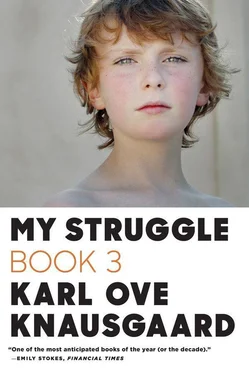With Lars as a friend everything that Tybakken could throw at me bounced off. At the same time I had changed, it happened almost from one day to the next, I was no longer interested in good deeds, quite the contrary, I started swearing, I went apple scrumping, I threw stones at street lamps and shed windows, I was prone to talking back in class and I stopped praying to God. The freedom there was in that! I loved apple scrumping, and the greater the risk the better. Stopping my bike by the curb in the morning on the way to school, sprinting into a garden and helping myself to five or ten apples in broad daylight and then just straddling my bike and continuing on my way as though nothing had happened gave me a good feeling I hadn’t known before and hadn’t even known existed. One of the gardens I passed was newly established, and in the middle there was a little apple tree, with a single apple on it, and it didn’t require much imagination to see that the apple had special significance for the father who had planted the tree that spring and for his two children who were looking forward to the day the apple, which for them must have been the apple, became ripe. It was their apple that I saw dangling there every morning on the way to school and that in the end I grabbed.
Not in the evening when it was dark and the odds of doing it unseen were good, no, I did it in the morning on the way to school, just dropped the bike, climbed over the fence, walked across the lawn, snatched the apple, and sank my teeth into it as I was walking back. A world had opened. I wasn’t stealing from shops yet, but it was on my mind, I was considering the possibility. At home, however, the only way I had changed was that I behaved more freely, was happier, chatted more, which Mom didn’t appear to find unusual since a lack of liberty was strongly attached to Dad’s presence and his anger only found its most extreme expression when we were alone with him. With Mom and Yngve I had always been like that. With Mom I had always talked about everything, that is, seldom about things directly concerning the world outside, I spoke more about things that I was thinking at any given point, all kinds of ideas and notions, but these days I was beginning to become aware of what I said and what I didn’t say to her, for I understood that it was important that one world had to be light and clean and exclude any of the other world’s many, long shadows.
This autumn both these worlds opened, but it was no mechanical garage door being raised, this was a living, organic process governed by a muscle: every Friday when Dad came home the world closed around me again, the old patterns were resumed, and I stayed there as little as possible. But whereas the world at home was familiar and always the same, the world outside was completely unpredictable, or, to be precise, what happened, happened clearly and unequivocally and without any ambivalence; it was the causes of these events that were so murkily unclear.
Every Friday there was a youth club meeting in the school’s old gymnasium. It was open to all the students in the school. For a couple of years it had been a mythological place for me, as fascinating as it was unattainable. I had seen Yngve dress with meticulous care before going there, even with a scarf once, I knew they had dancing there, table tennis, and billiards, sold Coke and hot dogs, sometimes showed films, held concerts, and put on special events. There was quite a lot of talk about us being allowed to enter this miraculous place one day, mostly by the girls, for in some strange way they were the ones who identified with it most closely, as though it were primarily for them, but only now and then for us boys.
The first time I cycled there it felt as though I was about to go through a rite of passage. The evening air was cool, up the hill toward the school I passed some year-seven girls, all of them had made a special effort with their appearances, none looked as they did every day. I parked the bike outside, ambled past the crowd of kids smoking, bought an admission ticket, and entered the dark converted gymnasium with kaleidoscopic spotlights, flashing disco balls, and music pounding out from two enormous loudspeakers. I looked around. There were lots of year-eight and year-nine girls there, none of whom dignified me with a glance, of course, but most people were year-sevens like me. We were the only ones for whom the club had novelty value.
The dance floor was empty. Most of the girls were sitting at tables by the wall; most of the boys were hanging out in other rooms, where the table tennis and pool tables were, or outside the exit where kids always gathered with mopeds during the evening. Many belonged to boys who had left school, but not so long ago that they had stopped keeping an eye on the girls.
But I wasn’t there to play table tennis or hang around the parking lot with a Coke in my hand. I liked music, I liked girls, and I liked dancing.
I didn’t dare dance on my own on an empty floor. But when a couple of girls I was friends with tentatively began to dance and two more joined them, I also ventured out.
Captivated by the rhythm and the pleasurable awareness that I was so visible, I danced away. One song, two songs, and then I went to find someone I knew. Bought a Coke and sat down with Lars and Erik.
My whole being, with my liking for clothes, my long eyelashes, and soft cheeks, my know-all attitude, and poorly concealed academic prowess, was fertile and ready ground for a pre-puberty catastrophe. My behavior on these evenings didn’t exactly improve matters. But of that I knew nothing. I saw nothing from the outside, I experienced everything from the inside, where all that counted was the seductive, pumping rhythm of “Funkytown,” the Bee Gees’ strange falsetto singing, Springsteen’s catchy “Hungry Heart,” the glittering darkness, all the girls moving around inside it, with their breasts and thighs, mouths and eyes, the exciting aromas of perfume and sweat, that was what this was about. I could return home after these Friday evenings with my head totally in a spin, where normality had been cast under some mysterious spell and suddenly appeared in a murky light, unclear in a shadowy way, but endlessly rich and alluring, full of hope and possibilities. Because, hey, this was the gym we were talking about! This was Sølvi, Hege, Unni, and Marianne! Geir Håkon, Leif Tore, Trond, and Sverre! This was hot dogs and ketchup and mustard! The tables and chairs were the same ones that were in our classrooms. The bars on the walls, the ones we had in gym class. But they were of no significance when the darkness came and the flashing lights filled it, when everything was sucked into the dark circle of magic, so full of promise, when everything was dusky eyes and lovely, soft bodies, pounding hearts, and jangling nerves. I left the youth club after the first Friday in a daze, I arrived there on the next, tense and full of expectancy.
What was brilliant about the place was that it made it easier for you to approach girls. Usually they were out of your reach, in recent months the majority had a blasé, world-weary air about them, they sat there in the sun chatting or knitting during the breaks with their cassette recorders on, most of what we did was childish, they were impossible to reach. Even though I tried, because I still spoke their language, it never led to anything. As soon as the bell rang we went our separate ways.
But at the youth club it was different, there you could go straight up to a girl and ask her to dance. So long as you didn’t set your sights too high and approach the most attractive year-nine with boys buzzing round her, it always went well, they said yes and all you had to do was step onto the floor, press yourself against her warm, soft body, and sway from side to side until the song had finished. The hope was that it would develop into something more, perhaps being followed by stolen glances and tiny mischievous smiles, but even if it didn’t, these moments had value in themselves, not least because of all the promises they bore of a future paradise in complete nakedness. All the girls I had gone out with so far, Anne Lisbet, Tone, Mariann, and Kajsa, went to school and were at the youth club, but even though I could still feel a stab in the heart when I saw them with boys, they were dead to me, history, from them I wanted nothing except that they shouldn’t say anything to others about the person I had been. Especially in Kajsa’s case. I had realized that what happened in the forest was ridiculous, I had behaved like a complete clod, I was deeply ashamed, and had decided long ago that I would never tell anyone, not even Lars. Especially not Lars. But she had no reason to feel ashamed, and I kept a bit of an eye on her when she was in the vicinity, to see whether she would lean forward and whisper, and everyone would look at me. It didn’t happen. Instead the body blows came from other, unexpected sources. Right from the fourth class I’d had my eye on Lise in the parallel class, she was good-looking and I liked watching her, the way she smiled, what she wore, the sharpness in her character, she was one of those who would say if she didn’t agree, she was fearless, but her facial expressions were gentle, and when we started the seventh class, her figure was beautifully rounded. More and more my eyes were drawn to her. She was Mariann’s best friend, and after the arguments since I had ended it with her had subsided Mariann and I would often sit together and chat or walk together back from school, and it was on one of those occasions she repeated something Lise had said about me that day.
Читать дальше












